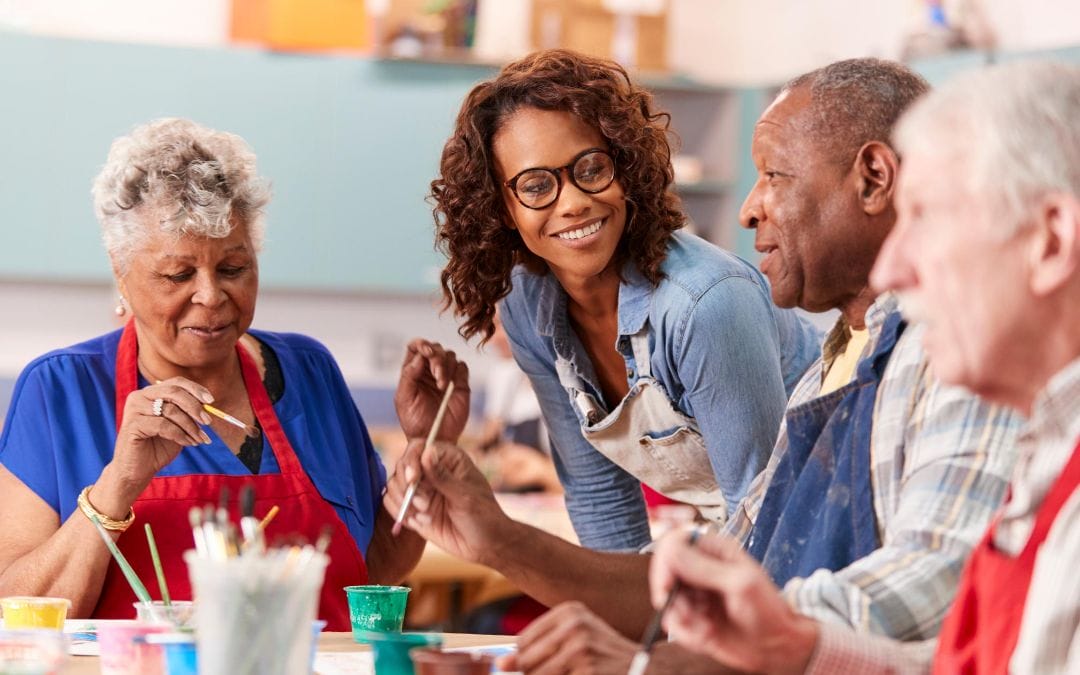For those with dementia, finding alternative methods of expression and connection are important in overcoming any potential verbal communication challenges. Art therapy is an inclusive and creative strategy that provides outlets to share one’s emotions, experiences and needs.
First, What Is Art Therapy?
For those with loved ones with dementia, you might be asking, “What is art therapy and how can it help with their overall wellbeing?”
Art therapy is a strategy that involves painting, drawing and other mixed mediums as a tool to help reclaim self-expression and maintain mental wellness. For those with dementia, it can also be used to share memories or ideas through means beyond verbal communication. Researchers believe that artistic expression can dramatically increase in the absence of verbal skills.
According to AARP, “when dementia is localized to the left side of the brain, patients experience a progressive loss of language, but tremendous visual creativity can emerge […] In patients with language loss, the visual side of their brain stops being inhibited by the verbal side, and that allows their visual creativity to be released.”
The article continues by sharing that, “even those who have displayed no artistic ability in the past might find an outlet with help from trained facilitators. And those who have been artistic can find comfort in returning to a skill. Whatever the creator’s background, the art can depict memories from life before dementia.”
Art Therapy Can Build Social Connections
According to recent research, when facilitated in groups, art therapy encourages social interactions and fosters relational bonds between participants. This communal activity can also reduce the negative impacts of loneliness and isolation, which tend to affect older adults at a higher rate. In addition to forming bonds with others, it may also activate certain memories that can reinforce interpersonal connections with family members.
Art Therapy Can Strengthen Motor Skills
The simple act of holding a paintbrush and creating deliberate strokes on a canvas lets participants improve or regain their hand dexterity and precision. According to the International Journal of Environmental Research and Public Health, experiencing cognitive decline may weaken areas of the brain that control fine motor skills and impair functional movements, balance and coordination. Through the support of art therapy, one actively strengthens their muscle range-of-motion and eventually may be able to transition these skills to autonomous self-care tasks such as getting dressed or brushing teeth.
Art Therapy Can Help Regulate Emotions
Suppose a resident or individual is experiencing emotional and behavioral changes due to anxiety, depression or confusion. In that case, art therapy is a great resource for creating a safe, stable environment to mitigate these effects. One study found that repetitive, methodical actions like drawing colors, shapes and lines can provide both emotional comfort and regulation. The ability to control both the pace of an activity and the final product can have a soothing effect on participants who may otherwise be prone to agitation.
Art Therapy Can Bolster More Confidence
Artistic expression has been proven to transmit dopamine and serotonin to the brain, with chemical receptors increasing feelings of confidence, self-worth and accomplishment. Memory loss can weaken one’s sense of identity, but the satisfaction that comes with creating a finished piece of artwork can restore pride and self-esteem. As confidence grows, an individual’s outlook and mood stabilizes, leading to increased resilience to new emotions or environments.
Art Therapy at Vineyard Henderson
After exploring the benefits this practice offers, it’s important to discuss practical applications. Vineyard Henderson has partnered with Friends of Parkinson’s to build an innovative and accessible art therapy studio for our future memory care residents. We are excited to offer this to our holistic array of services.
Please reach out to a member of our team to discuss this unique program and partnership.

